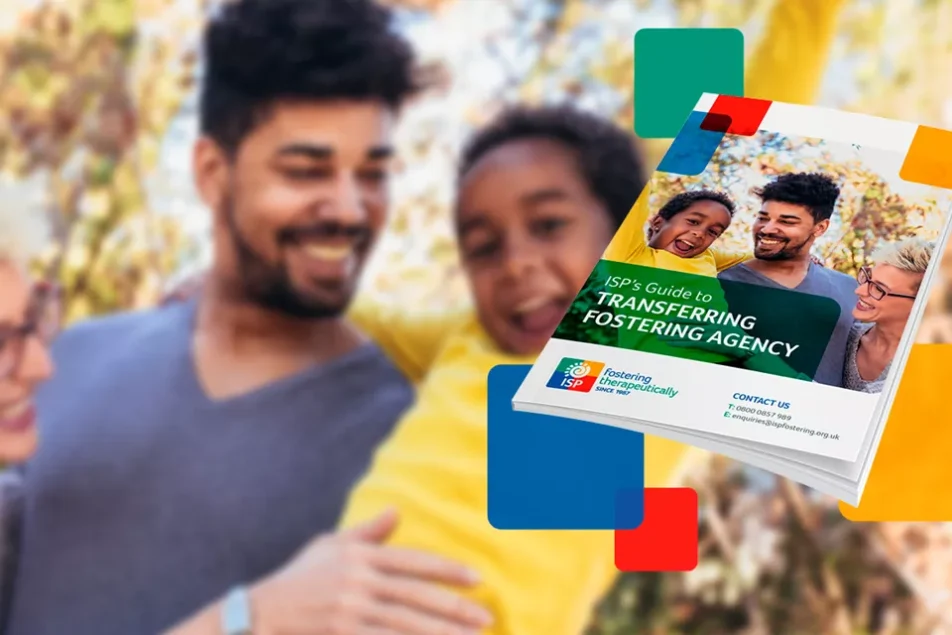What is the TSD Workbook?
The Training, Support and Development Standards Workbook (TSD) is part of the National Minimum Standards for Fostering Services set out by the Government in 2011; you must complete it within the first year of having a child in your care, and it applies to all types of foster care.
Although it’s necessary to complete the booklet, there are so many benefits to doing so. You’ll be able to see the considerable amount you’ve accomplished during your first year of fostering and appreciate how well you’ve applied the knowledge you have learnt through training and practice.
Together with your social worker, you’ll also identify any further support or training you may need to progress on your fostering journey.

The Seven Standards
The Seven Standards divide the TSD workbook into sections. We have summarised these sections to help simplify the process and have provided links to any additional guidance that has been helpful to others.
If you foster with ISP, you’ll receive a TSD workbook portfolio divided into subsections with practical notes, guides and questions. The government has also created a guide to completing the TSD workbook; read this before you get started! It should answer many of your questions.
Standard One: Understand the principles and values essential for fostering children and young people
The principles and values are the standards of behaviour expected from you as a foster parent when fostering a child. As you have recently started your fostering journey, you may or may not be familiar with them; here is a reminder:
- Put your foster child’s welfare above all else.
- Contribute to your foster child’s care, development, education and safety.
- Celebrate individuality and diversity.
- Make sure your foster child has equal opportunity.
- Nurture their well-being, health, self-esteem and resilience.
- Ensure their safety.
- Respect confidentiality and know its limits, for example, if you need to share information to safeguard the child in your care.
- Share your knowledge and skills.
You’ll also be required to show your knowledge of the UN Convention on the Rights of the Child and how your care relates to the Five Outcomes in Every Child Matters.
If you foster with ISP, we recommend that you read the following policies and procedures before completing Standard One:
- Confidentiality – Essential Information for Foster Parents
- Sexual Health: Consent and Confidentiality
- Safeguarding Policy
- Safeguarding Children Procedure
ISP has created I-space to make it easier for foster parents to access policies, guidance and handbooks.
Standard Two: Understand your role as a foster parent
Standard two is about understanding legislation, policies and procedures that apply to your role as a foster parent; it includes:
- Your role and responsibilities.
- Your supervising social worker’s role and responsibilities.
- The aims of your foster agency.
- Knowing the relevant legislation, policies and procedures and their importance.
- Contact with your foster child’s family and friends.
- Knowing how you, your foster child and their family can access the complaints procedure.
- Working with your agency, the local authority and your supervising social worker.
- Remaining organised.
If you foster with ISP, we recommend that you read the following policies and procedures before completing Standard Two:
- Introduction to ISP
- Statement of Purpose – You can download the Statement of Purpose for your local centre here.
- Foster Care Procedures Manual
- Compliments, Complaints and Representations Procedure
- Complaints Procedure for Children and Young People
Standard Three: Understand health and safety, and health care
Standard three delves into the nitty gritty of health and safety laws and regulations. Included in this section:
- Being aware of your responsibilities regarding health and safety legislation.
- Your agency’s procedures that promote the health and safety of the child in your care.
- Maintaining a clean and safe home.
- Your fire escape plan.
- First aid.
- What does ‘healthy care’ mean for the overall well-being of your foster child?
- Allergy and infection control procedures.
- Understanding the health and hygiene needs of the child in your care.
- Knowing what to do if your foster child becomes ill or injured.
- Understanding the consent required for medication and health procedures.
- Promoting a healthy lifestyle.
- Willing to undertake specialist training if your foster child has a specific health need.
- Risk assessment of possible threats from the environment, your foster child’s survival strategies and other people.
If you foster with ISP, we recommend that you read the following policies and procedures before completing Standard Three:
Standard Four: Know how to communicate effectively
Talking, listening and understanding are essential to your role as a foster parent. Standard four covers:
- Using empathy to understand your foster child and their family.
- Knowing the best ways to communicate with your foster child.
- The procedures for arranging contact with your foster child’s family.
- Good communication with your foster agency, social worker and other organisations, such as schools.
- Using different forms of communication, such as email and fact-to-face discussion.
- Raising concerns.
- The importance of confidentiality.
- Your foster agency’s policy on good record keeping and using factual information.
- Encouraging the child in your care to engage in record keeping and to keep their own records.
If you foster with ISP, we recommend that you read the following policies and procedures before completing Standard Four:
Standard Five: Understanding the development of children and young people
Standard Five: Understanding the development of children and young people
You play a pivotal role in the child in your care’s development. Standard five focuses on how you:
- Help children develop healthy relationships.
- Understand the impact of loss, separation, trauma and interrupted development.
- Build self-esteem and resilience in your foster child.
- Prepare your foster child for milestones such as adulthood.
- Support your foster child through challenges and changes in circumstances, such as starting a new school.
- Encourage your foster child to reach their full potential through further education, training and employment and advocating on their behalf if necessary.
- Understand the importance of play and activities on child development whilst promoting and adapting activities for children with disabilities.
- Understand the benefits of routine.
- Recognise your foster child’s situation and how their family, friends and yourself as their foster parent can enhance and hinder their development.
- Support your foster child to form a positive understanding of their sexuality.
- Understand the ‘social model of disability’ and how it relates to you as a foster parent
- Know and support the needs of your foster child if they have a disability or learning difficulty.
Standard Six: Keep children and young people sage from harm
Standard six emphasises the safeguarding of foster children. It includes:
- Safeguarding legislation, policies and procedures both nationwide and in your foster agency.
- What does your foster child require to feel safe?
- Guiding foster children on ways to safeguard themselves.
- Creating and maintaining ‘safer care’ guidelines for your household.
- Recognising the signs of abuse and neglect.
- Understanding the various ways your foster child can experience abuse from adults and other children.
- The action you need to take if you believe the child in your care is experiencing bullying.
- Knowing when to action safeguarding procedures if you are concerned about the safety of any child or young person.
- The responsibilities of your fostering agency and other organisations, such as schools and your local Safeguarding Children Board in keeping your foster child safe.
- Whistleblowing.
If you foster with ISP, we recommend that you read the following policies and procedures before completing Standard Six:
Standard Seven: Develop yourself
Standard seven highlights the importance of continual training and development. It includes:
- The impact fostering has on you and your family.
- Knowing when and why you need support and where to get it.
- Challenges LGBTQIA+, male, or ethnic minority foster parents may face.
- Training that you and your family can access.
- Utilising opportunities for improvement, such as your annual foster parent review.
- Reflecting on feedback from your foster child and their family.
- Your personal development plan.
- Career and higher-training opportunities that are available to you as a foster parent.
If you foster with ISP, we offer extensive training.
- Therapeutic Pathway – This City & Guilds Assured training programme teaches you to utilise therapeutic methods in foster parenting.
- Mandatory Training – This fundamental training takes place in your first year and covers topics such as first aid, behaviour management and equality & diversity. They are an essential part of the TSD standards.
- Additional Training – We offer courses in specialist subjects to help you broaden your knowledge, such as Internet Security, Managing Disclosures and Leaving Care.
How Working through the TSD Workbook Benefits You
One of the benefits of the TSD Workbook is that by reflecting on your knowledge of the principles and values and working through the standards, you can see how much you’ve already accomplished to improve the child in your care’s life, and you should celebrate your achievement.
Other benefits of the TSD Workbook include:
- You’ll be able to clarify the role and responsibilities of yourself, your fostering agency and your supervising social worker.
- It can help refresh your knowledge of your foster provider’s policies and procedures if you need to refer to them in the future.
- You can ensure that the child in your care has a safe environment to flourish both physically and emotionally.
- You can identify which techniques have helped you to communicate with the child in your care and how this has empowered them.
- You’ll become more familiar with processes, such as handling sensitive issues and raising concerns when appropriate.
- The TSD Workbook will highlight any significant steps you’ve made during your first year to aid the child in your care’s development by learning about them as an individual and, if you have completed any relevant training, how you’ve put this into practice.
- You’ll be able to assess your routine and illustrate how you encourage the child in your care’s self-esteem.
- You may be at the beginning of your journey, but you’ll be able to recognise any milestones the child in your care may have reached or identify ways to help them achieve milestones in the future.
- You can evaluate the hobbies and activities you have enrolled the child in your care in or are considering enrolling them in.
- By re-evaluating your understanding of safeguarding and asking for support if needed, you’ll feel confident knowing the child in your care’s welfare is protected. You’ll be more equipped to identify and take action if you have any concerns in the future.
- You can reflect on the TSD Workbook with your supervising social worker, who will support you if you need to apply for further training to make your career as a foster parent both successful and fulfilling.
The TSD Workbook is a fantastic resource for foster parents because it enhances your understanding of what it means to be a foster parent and highlights the skills you’ve used and developed throughout the year. Why not download the workbook and the guidance and get started?
On the Mumsnet forum, many of you asked for example answers to the TSD standards. Every person’s fostering journey is different, so everyone’s answers will be unique. If you follow our guidance, it should make the process simpler for you.
How ISP can support you in completing your TSD Workbook
At ISP, you are never alone; you receive wrap-around support from the team working around your family. As soon as you’re approved, you’ll receive your TSD Workbook Portfolio and an invitation to attend our TSD Workbook workshops at your local centre. At the TSD workbook workshops, you’ll work through each standard over several weeks with other foster parents, coming up with answers together.
In addition, you’ll be assigned a dedicated fostering advisor who will be there to guide you every step of the way. What sets our advisors apart is their personal experience in fostering; many of them have been foster parents themselves. They understand the challenges you may face and can provide practical, hands-on support to help you navigate through the TSD workbook and beyond. Contact your supervising social worker or local centre for further details.

Frequently Asked Questions about the TSD Workbook
When do you start working through the TSD Workbook?
Once you become an approved foster parent, you’ll receive your TSD Workbook portfolio. At ISP, your portfolio is divided into subsections with plenty of guidance and links to specific policies and procedures to help you complete each standard.
How long does it take to complete?
The TSD Workbook has to be completed before your first review, 12 months after you become an approved foster parent. It can take some foster parents a few weeks and others 10 – 11 months. It depends on your engagement with the workbook and whether you attend workshops or seek further help.
Do you complete the TSD workbook all in one go or one section at a time?
You can complete it in one go, but we don’t advise that you do. Start with the sections that you find easier and go back to previous sections at a later date. The workshops at ISP take you through one standard at a time. So, if you are struggling with a particular standard, wait until the workshop or until you have spoken to your fostering advisor to complete that section.
What information should I write in the workbook? Is it evidence of learning?
The TSD Workbook is the minimum standard for fostering that you can build on as you continue your fostering journey. It is about your basic knowledge of fostering, so it doesn’t need to be academic and don’t worry about spelling! You can include specific training; for example, if you are evidencing your knowledge of first aid, you can reference your first aid certificate. Most of the questions, however, aren’t about specific training but about your understanding of the topics raised in that standard.
What structure should my answers be in?
Some people prefer to write in paragraphs, and some in bullet points; as long as you answer the questions, it doesn’t matter how you structure your answers.
Can children’s names be added, or should I use their initials?
Two people from your local fostering centre will evaluate your TSD Workbook, your supervising social worker and a verifier. As it will remain confidential, you can include children’s first names, but initials are also ok if that’s your preference.
Are there any specific training courses that will help me complete a section?
Although some of the courses will fit the standards of the TSD workbook, you won’t have time to complete all the courses before you start answering the questions. Attending workshops and speaking to your fostering advisor or other foster parents is the best way to understand the information required.
Once finished, will it be reviewed? Can I fail?
Once completed, the TSD Workbook will be reviewed by your supervising social worker, a verifier, and will go into your annual review. There is no pass or fail; it’s complete or incomplete. Keep going until you’ve evidenced your knowledge of each standard.
What happens once I have completed the TSD Workbook?
You will receive two certificates, one from your fostering agency and a TSD certificate of completion. If you transfer to another agency, you can take the certificates with you, so you only have to complete the workbook once. You can also use the workbook if you move from fostering into another care profession, such as residential care.
Tips to help you complete the TSD Workbook:
- If you are unfamiliar with any of the terminology used in the TSD workbook, head to the glossary of terms at the end of the TSD Workbook guide.
- Take your time; it is not something that you are likely to be able to complete in one go. Give yourself plenty of time and take breaks.
- Skip questions you need extra advice on and come back to them later.
- Ask your friends for help; they may be able to remember a time you taught a child in your care a life skill or handled a complex situation if you can’t.
- If you are fostering with a partner, work through the workbook together. It can make the process easier, as you will both have relevant experiences to use as examples.
- It is not as scary as it looks; talk to foster parents who have already completed it for reassurance and advice.
- Utilise workshops and your fostering advisor; you don’t have to complete it alone.
If you’d like more information on fostering with ISP, contact us, and one of our dedicated experts will be happy to support you with any questions you may have!








